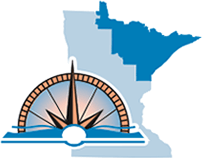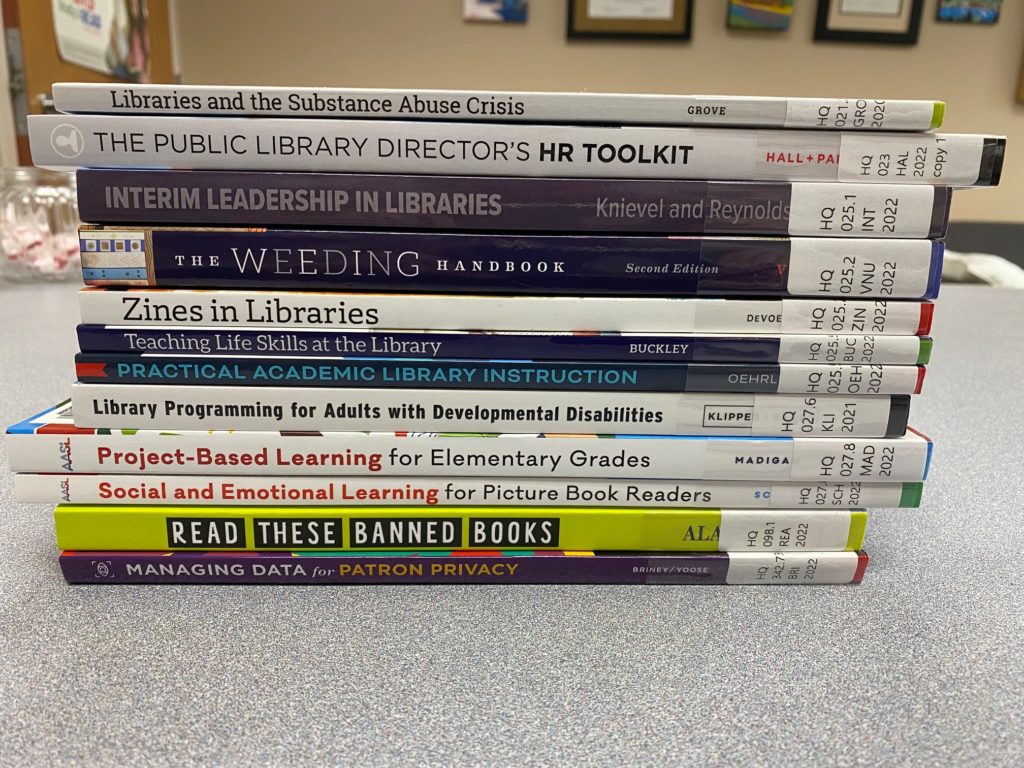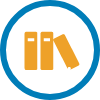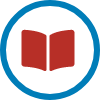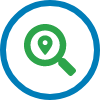Arrowhead Library System (ALS) has a long-standing commitment to maintaining a collection of current publication titles of interest to librarians, library staff and library trustees. The collection is housed at the ALS Headquarters in Mountain Iron, but all titles can be requested via the online catalog (if you have a borrower’s card from an ALS library) or via the statewide MNLINK catalog (if you have a borrower’s card from Duluth Public Library). If you have questions about borrowing titles from the ALS Professional Collection, feel free to call ALS staff! Here are the latest additions to the ALS collection:
Libraries and the Substance Abuse Crisis: Supporting Your Community
Cindy Grove
ALA Editions, 2020
021.2 GRO 2020
The opioid epidemic, and other behavioral health issues such as alcohol and drug abuse, directly impact every community across the nation; and, by extension, public libraries’ daily work. Because libraries are not only trusted guardians of information but also vital community centers, people struggling with addictive behaviors as well as their family members and friends often turn to the library for help. But many library workers feel overwhelmed, finding themselves unprepared for serving these patrons in an effective and empathetic way. This book encourages readers to turn their fears and uncertainty into strengths and empowerment, offering to-the-point guidance on welcoming people with substance use disorders and their loved ones through policy, materials, outreach, collaboration, programs, and services. Written by a frontline librarian whose personal experiences inform the book, this resource
- explores the library’s role in the fight against addiction and how to become part of the solution by combating stigma;
- provides background on understanding how substance abuse and related behaviors affect different age groups and populations;
- explains how to be proactive regarding library safety and security by carefully crafting library policies and effectively communicating them to staff;
- offers real world guidance on training library staff, including pointers on recognizing observable signs of drug abuse and responding appropriately and safely to uncomfortable or potentially dangerous situations;
- discusses safeguards such as a needle disposal unit, defibrillator, and Naloxone;
- gives tips on marketing, outreach, and programming, from putting together displays of materials and resources to partnering with local organizations; and
- recommends useful websites, documentaries, and additional resources for further learning.
The Public Library Director’s HR Toolkit
Kate Hall and Kathy Parker
ALA Editions, 2022
023 HAL 2022
Human resources is an area of leadership that requires its own specialized knowledge, but many library managers and directors assume their roles without any background knowledge of HR or adequate training. This comprehensive toolkit, which has been vetted by HR professionals as well as an attorney who specializes in employment law, is here to fill those gaps. Taking you through the lifecycle of an employee, and also providing a framework to develop skills and confidence, in this book you will learn
- ways to incorporate an EDI lens into your employee processes, starting with accurately crafted job descriptions that are posted on diverse job boards;
- tips for hiring and onboarding new staff;
- advice on individual employee development and retention, from the importance of continuing education to methods for increasing staff engagement and strengthening morale;
- considerations for treating all employees equitably to maintain a welcoming and inclusive space for staff from marginalized populations;
- an overview of the essential HR laws that come into play, helping you navigate difficult situations like discipline and termination;
- first-hand accounts of HR successes and challenges; and
- how to create a personalized structure around your HR learning and put it into practice, using a variety of worksheets, questions for reflection, templates, and tools provided in the book.
Interim Leadership in Libraries: Building Relationships, Making Decisions, and Moving On
Edited by Jennifer E. Knievel and Leslie J. Reynolds
Association of College and Research Libraries, 2022
025.1 INT 2022
Interim Leadership in Libraries: Building Relationships, Making Decisions, and Moving On draws on evidence-based research, professional expertise, and personal experience to address the practical implications that arise from the decision to appoint interim leaders. Authors from a variety of institutions who have served in many different interim roles explore this unique type of leadership in five thorough sections:
- Building Relationships for Interim Leaders
- Leading with Confidence
- Making Long-Term Decisions as an Interim Leader
- Leading Through Contraction: When No One Can Be Hired
- Moving On: When the Dust Settles
Chapters cover topics including serving as a non-librarian interim, leading through a hiring freeze, strategic planning and reorganization as interim, and developing future library leaders. Individuals asked to step into interim or acting leadership roles face personal and professional challenges. This book will help leaders, and those who work with them, learn from the successes and failures of others who came before them in order to have a lasting impact on their organization.
The Weeding Handbook: A Shelf-by-Shelf Guide, 2nd Edition
Rebecca Vnuk
ALA Editions, 2022
025.2 VNU 2022
Filled with field-tested strategies and adaptable collection development policies, this updated handbook will enable libraries to bloom by maintaining a collection that users actually use. Now Vnuk has revised and updated her text to keep pace with libraries’ longer-term shifts in collection development and access, such as a growing emphasis on digital collections and managing duplicate physical materials. She demonstrates how weeding helps a library thrive by focusing its resources on those parts of the collection that are the most useful to its users. Walking collections staff through the proverbial stacks shelf by shelf, this book
- includes a new “Tales from the Front” feature, providing real-life case studies of librarians working on weeding projects;
- explains why weeding is important for a healthy library and how it can positively affect library budgets;
- systematically walks readers through a library’s shelves, with recommended weeding criteria and call-outs in each area for the different considerations of large collections and smaller collections;
- offers easily adaptable, updated sample development plans which reflect the latest thinking in collection development;
- advises readers on weeding problematic materials, such as those that include racist themes and depictions;
- presents updated and expanded guidance on special considerations for youth collections;
- addresses reference, media, magazines and newspapers, e-books, and other special materials;
- shares guidance for determining how to delegate responsibility for weeding, plus pointers for getting other staff members on board; and
- gives advice for educating the community about the process, how to head off PR disasters, and what to do with weeded materials.
Zines in Libraries: Selecting, Purchasing, and Processing
Edited by Lauren DeVoe and Sarah Duff
ALA Editions, 2022
025.2 ZIN 2022
Featuring contributions from leaders in the intersection between zines and libraries, including Katrin Abel, Jeremy Brett, Ann (A’misa) Matsushima Chiu, Marta Chudolinska, Jenna Freedman, Joan Jocson-Singh, Mica Johnson, Lauren Kehoe, Joshua Lupkin, Meg Metcalf, and Ziba Perez, this book presents an in-depth look at adding these unique materials successfully to a library collection. Their homegrown and esoteric aesthetic make zines important cultural and historical objects. Including them in library collections is a perfect way to amplify underrepresented voices. But the road from acquisition to cataloging these underground, self-published, and often fragile items can be difficult. This resource smooths the path forward, offering top-to-bottom guidance for collection development and acquisitions staff, administrators, catalogers, and access services librarians in understanding and processing zines for library collections. Readers will learn
- why these collections are valuable, and how libraries can start a collection of their own;
- targeted advice on zine collection development and management, including policy, selection, cataloging, and promotion;
- how to navigate the challenges of obtaining zines from small independent vendors, zinefests, distros, third-party donors, and art collectives;
- ways to work with zine creators to develop a respectful preservation program;
- insights from a case study exploring genre, context, and purpose in contemporary Latin American fanzines;
- where zines can fit in at school libraries or in one-shot instruction; and
- a look at the future of zines, from online zines to zine communities that are increasingly accessible, inclusive, and diverse.
Teaching Life Skills at the Library: Programs and Activities on Money Management, Career Development, and More
Kimberli S. Buckley
ALA Editions, 2022
025.5 BUC 2022
Between making financial decisions, maintaining a healthy work–life balance, and juggling health, family, friends, and other responsibilities, life can feel overwhelming. Place these same responsibilities on an individual just entering adulthood who has less real-life experience and it can feel even more overwhelming. So why not make sure our teens and young adults are more prepared to face the world before they go out on their own? How can we also reinforce these skills for adults who may never have learned them or who may need a refresher? This book provides a hands-on and interactive approach to creating and planning library programs and activities that will enable patrons to learn and build the most important life skills. Readers will discover
- how life skills library programs can encourage participants to imagine and prepare for real-world situations;
- a rich variety of step-by-step programs, complete with planning tips, instructions, and a materials and equipment list, for activities such as Mock Job Interviews, Financial Literacy Jeopardy, planning of week of dinners, Spring Cleaning Visualizations, the art of packing a suitcase, practicing self-care, a stress-relief dance party, and many others;
- advice on planning, partnership opportunities, promotion, evaluations, and sustainability;
- ways to promote a safe space and a relaxed environment while leading programs; and
- additional helpful resources, including a planning template and reading tie-ins.
Practical Academic Library Instruction: Learner-Centered Techniques
Jo Angela Oehrli
ALA Editions, 2022
025.5 OEH 2022
When you stand alone in front of the class, being in command of your content is only the first step. Knowing how to engage students’ participation in ways that foster “ownership” ensures that learning is both active and lasting. In this guide, Oehrli shares tried and tested techniques honed from 20 years of practice in both traditional and nontraditional settings. Drawing from educational research, she applies these techniques to the learner-centered teaching of information literacy topics. In this book, which is organized for quick access to techniques at your point of need, you will learn
- how to use guiding principles to shape your personal philosophy of teaching;
- ways to address the uneven power dynamics of a classroom;
- 5 basic questions to guide your preparation for a class;
- pointers for communicating with students in the language of the ACRL Framework;
- simple and subtle ways to build rapport with students;
- real-world applications of education research concepts such as Keller’s ARCS theory of motivation;
- metacognitive techniques that foster student ownership of learning;
- other tips for asking good discussion questions and how to use the think/pair/share method to encourage discussion;
- techniques for defusing distraction in the classroom through proximity, pivoting, and pausing; and
- interactive methods to uncover students’ prior knowledge in research.
Library Programming for Adults with Developmental Disabilities
Barbara Klipper and Carrie Scott Banks
ALA Editions, 2021
027.6 KLI 2021
Public libraries everywhere have embraced inclusion and expanded their programming for youth with disabilities, especially autism. It’s imperative that libraries also offer rich and age-appropriate initiatives for adults with developmental disabilities; after all, as youth now served by their libraries grow up and reach adulthood, they will continue to want and expect libraries to be responsive to their needs. Klipper and Banks, two librarians with a long-standing focus on inclusivity, combine research-based theory and an introduction to best practices with details on how to replicate field-tested programs for adults with developmental disabilities (DD). Readers will
- learn key ideas about DD, such as an examination and debunking of commonly held stereotypes and misconceptions about people with DD and the role ableism plays in perpetuating them;
- be introduced to self-advocates and their ways of viewing DD, including terminology and the Neurodiversity movement;
- get pointers on how to create a culture of inclusion at the library, with discussions of Universal Design and UDL, staff training, and anticipating the unexpected;
- explore the needs of adults with DD who are also LGBTQA+, people of color, immigrants and English language learners, seniors, those with dual diagnoses, and other aspects of intersectionality in library programming;
- understand how to build on and modify existing children’s and YA practice to ensure that library users with DD receive age-appropriate and respectful library service;
- learn how to make virtual programming accessible and which programs can be successfully brought online;
- discover a myriad of programs ready to adapt for their own libraries, such as Sensory Storytime for adults, book clubs, arts and crafts programs, adaptive gaming, job skills workshops, cooking programs, and many more;
- see how programming for adults with DD works in academic libraries; and
- gain skills for outreach and keeping current, with guidance on forming and strengthening partnerships, advocacy, fundraising, marketing, and additional resources for deepening knowledge of DD.
Project-Based Learning for Elementary Grades (AASL Standards-Based Learning Series)
Maura Madigan
ALA Editions, 2022
027.8 MAD 2022
This inspiring tool demonstrates how project-based learning (PBL) projects can be used in a variety of settings and provides coaching for educators who aspire to create their own projects. Madigan’s book delivers flexible, interdisciplinary, learner-driven projects that support the National School Library Standards. Readers will find background on project-based learning (PBL), a breakdown of the essential parts of a project, and ready-made PBL projects that can be used with minimal preparation. Designed for both beginning and experienced school librarians and educators interested in facilitating PBL projects with elementary learners, this book offers
- lessons, educator preparation steps, learner directions, worksheets, assessments, suggested materials, and resources;
- mini and extended versions of each project enabling use with diverse schedules, grade levels, and learner abilities; and
- chapters on collaborating with other educators, facilitating and adapting virtual PBL projects, and creating PBL projects.
Social and Emotional Learning for Picture Book Readers (AASL Standards-Based Learning Series)
Maureen Schlosser
ALA Editions, 2022
027.8 SCH 2022
Learners encounter social and emotional challenges every day. Some rise to the demands, while others struggle. Social and emotional learning (SEL) lessons can help all learners thrive. Busy school librarians and educators who appreciate the power of teaching with picture books will celebrate this all-in-one text designed to promote SEL through the school library.
Social and Emotional Learning for Picture Book Readers spotlights 24 compelling picture books with ready-to-go lesson plans that support social and emotional learning (SEL) through the National School Library Standards. Each chapter focuses on one SEL theme to help learners practice targeted social-emotional skills. Learners will develop skills in solving problems, building relationships, working in teams, recognizing and managing feelings, and engaging ethically. Most lessons can be taught in a single class period and provide
- picture books as mentor texts supporting SEL lessons and curriculum;
- AASL Standards-alignments with detailed instructions, making planning a breeze; and
- anchor charts, discussion questions, and worksheets to help facilitate SEL activities.
Read These Banned Books: A Journal and 52-Week Reading Challenge from the American Library Association
American Library Association
American Library Association + Sourcebooks, 2022
098.1 REA 2022
From the American Library Association comes a must-read challenge for book lovers and literary activists to explore! This interactive recommended reading list presents readers with a different banned or challenged book to explore each week. The perfect gift for all bibliophiles and social justice activists, this journal is far more than a simple list of reads. Each recommended title features a synopsis, review, and prompt for reflection, drawing on the expertise of editors from the association and its book review magazine Booklist, delving into why the book was censored. The titles span categories and genres, from fantasy and graphic novel to nonfiction and romance, but all have been challenged or banned at some point.
Managing Data for Patron Privacy: Comprehensive Strategies for Libraries
Kristin Briney and Becky Yoose
ALA Editions, 2022
342.7308 BRI 2022
Build trust with your library’s users by securing their data privacy. Taking a holistic approach, this guide presents practical ways to implement privacy ethics into data practices. Libraries are not exempt from the financial costs of data breaches or leaks, no matter the size. Whether from a library worker unwittingly sharing a patron’s address with a perpetrator of domestic violence to leaving sensitive patron data unprotected, patrons can also pay a hefty price when libraries fail to manage patron data securely and ethically. In this guide, readers will learn concrete action steps for putting the ethical management of data into practice, following two common public and academic library cumulative case studies. The authors explore such key topics as
- succinct summaries of major U.S. laws and other regulations and standards governing patron data management;
- information security practices to protect patrons and libraries from common threats;
- how to navigate barriers in organizational culture when implementing data privacy measures;
- sources for publicly available, customizable privacy training material for library workers;
- the data life cycle from planning and collecting to disposal;
- how to conduct a data inventory;
- understanding the associated privacy risks of different types of library data;
- why the current popular model of library assessment can become a huge privacy invasion;
- addressing key topics while keeping your privacy policy clear and understandable to patrons; and
- data privacy and security provisions to look for in vendor contracts.
